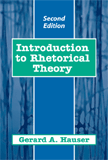1. The Eventfulness of Rhetoric
2. Rhetorical Thinking
3. Rhetorical Opportunities
4. Making Commitments through Rhetoric
5. Public Judgment
6. Finding Ideas
7. Using Good Reasons to Persuade
8. Persuasiveness of Character
9. The Passions
10. Narrative
11. Acting with Language
12. Experiencing Meaning in Rhetoric
13. Rhetorical Form as Strategy
14. Strategic Forms of Argument Structures

303 pages, $44.95 list
1-57766-221-0
978-1-57766-221-1
© 2002
paperback
Instructor's Manual available
eBook availability
Introduction to Rhetorical Theory
Second Edition
In this highly accessible new edition, Hauser systematically provides a humanistic account of what transpires when people communicate for some purpose. His masterful blend of classical and contemporary thinking about the use of language and the value of symbolic inducements for social cooperation illuminates fundamental rhetorical precepts and their implications for shaping human realities. The new chapter on publics theory complements the four chapters that introduce the broad themes and issues essential for a rhetorical approach to communication. The new chapter on narrative theory bridges the four chapters devoted to the content of rhetoric and the concluding chapters that emphasize symbolic processes by which humans induce social cooperation and constitute social reality. Throughout the text, Hauser skillfully underscores the power of language to present a particular reality. He explores the fundamental relationship between public discourse and judgment, helping students understand the core of rhetoric’s civic function. Through relevant, current examples, he illustrates how knowledge and power shape our social and political practices and how both are formed through discourse.